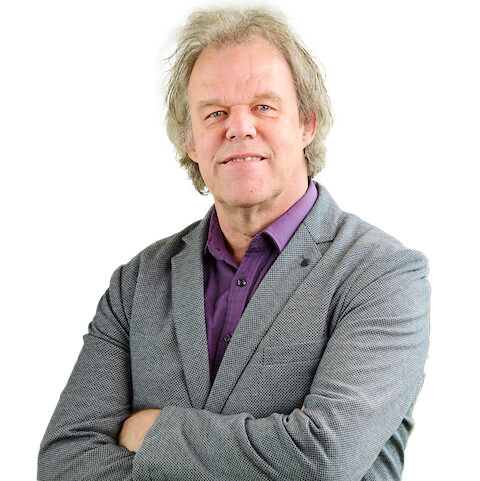‘Making computer science heard’
He is not your typical computer scientist. In fact, IPN board member and distinguished professor at Utrecht University Gerard Barkema has been working in theoretical physics groups for most of his research career. ‘But in my position as a scientific administrator, I feel I can bring more added value to the computer science field.’
How did you end up in computer science?
‘Besides Physics, I also studied Informatics. In fact, I conducted my PhD research in a Physical Informatics group. After that, I moved towards theoretical physics and was appointed full professor in that field. From the moment that I became director of education and later vice-dean of education at the Faculty of Science in Utrecht, I steadily moved more towards managerial tasks and was less involved in research myself. But since my research had always been on the interface between physics and computer science, concerning myself with computer science policy was a rather natural choice.’
What has your own research been about?
‘Over the years, I have mainly been active in the field of statistical physics, with a focus on disordered materials. I have developed new algorithms to accelerate model simulations, for example on amorphous silicon for solar cells, silica, and graphene. In real life it might take years for materials like glass to reach their equilibrium state, while in simulations, modelling the molecular dynamics in a nanosecond time frame is hard enough. How can you design simulation experiments in such a way that you can gain insights in long term processes within a reasonable experimental time frame? That has been the common thread in my research for a long time.’
How did you become involved in computer science policy?
‘Around 2017, Maarten van Steen, who was the president of IPN at the time, was invited to the Ministry of Education, Culture and Science to talk about the sector plans. At the time, I had already gained extensive experience with topics like human resources, finance, and strategy development, so I offered to join him.
When it comes to administrative tasks like these, I find it important that things are done properly. And to me, the game of negotiation feels like an intellectual challenge that much resembles playing computer games. It is always about who wants what, and how to achieve one’s goals in such a way that the others feel seen as well.’
“in my position as a scientific administrator, I feel I can bring more added value to the computer science field.“
What kinds of themes are close to your heart?
‘I am a strong advocate for close collaborations between universities and the national government, which substantiated for example in the I-Partnership program that connects government to educational institutes.
In addition, at Utrecht University we started a program where PhD students work half time for the government and half time at university. That way, the government gets skilled staff and the university gets paid for research. This culminated in the AI labs which now employ some 50 PhD students, plus 50 students who work in the hospital.
What not everyone realizes, is that on average, for ICT departments some 75 percent of the funding is meant for education, and only 25 percent for research. If you want to provide scientists with ample time to do research, you need to find additional funds for them. The more paid research you can acquire, the more permanent staff you can hire.
Some departments are wittier in this political game than others. I want to improve the political and lobby skills of the community. That is also why I decided to join the IPN board back in 2020.’
What do you perceive to be IPN’s most important role?
‘Overall, computer science as a field is still too modest. Take the funding. I once calculated that for every physics, mathematics or chemistry student, there is some 10,000 euros of additional research funding available. For computer science, this is about ten times less. IPN communicates and advocates the importance of the field to the outside world, and acts as an interest group for academic computer scientists.
Coming from the physics community myself, which traditionally is very outspoken about its own merits and as a result has always been very good at acquiring funding, I would advise computer scientists to be more outgoing and proud of their field. In our current and our future society, digitization will only gain in importance. The time has come to leave the modesty behind and acknowledge the importance of computer science for science and society. Because it is this field that will make the difference, both today and in the future.’
Photo: Sjoerd van der Hucht
